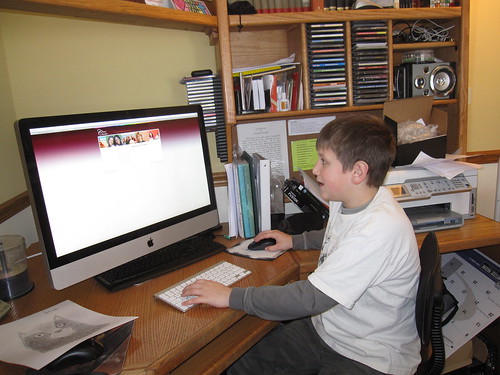If you want your children to grow up to be strong and independent adults, homeschooling may be the best choice. Teaching from home is not without its difficulties. It’s important to obtain advice from the experts, such as the ones who wrote the below article. Continue reading.
You can use other learning resources besides textbooks. Kids should be encourage to read everything they can, even comic books! Current events are a prime opportunity to open a discussion, so incorporate timely articles in your curriculum. This will also help them to think critically.
Older children should have one on one time set aside. Give them a special crafting area to play in. Ask your older children to help you teach the littler ones. The preschoolers will benefit a lot from being taught by older children and the older children themselves will appreciate the opportunity to share their own knowledge.
Use your own talents to create homeschooling resources. There are lots of resources that are expensive, but you can often substitute them cheaply. For example, making Japanese kanji flash cards are a cinch. Just laminate some index cards with the characters on them. When your children are allowed to participate, there is a greater sense of teamwork and shared progress.
You can incorporate chores and allowances as a part of their homeschool lessons because it teaches hem responsibility and money matters. You will find yourself stretched quite thin. Don’t try to do everything on your own. Therefore, ask for help and welcome it.
When you are teaching your children, you can give them lessons where they have the opportunity to really become immersed in the curriculum. For example, make learning about foreign cultures fun by experimenting with foreign cuisine. When studying Stalin, cook the foods related to this culture such as cabbage rolls. Prepare dishes and snacks from the countries you are studying or help your children put together some costumes from the historical periods you studied. If people combine learning with action, it is possible they will more thoroughly understand the information.
Learn what local laws you must follow. Some states have no notification requirements, some require you to submit lesson plans, and others require state standardized testing. Additionally, you should talk with your school district about the best way to handle truancy issues.
Make a list of all the pros and cons of both public schools and home schooling. Go back to this list and create lesson plans that address the cons you came up with and focus on the advantages of the method you chose. You will have essentially created a checklist of things to concentrate on and things to avoid. Put your checklist and objectives prominently displayed and refer to it as needed.
Are you homeschooling more than one child? You need to know how your current disciplinary strategies will work in the school environment. If you don’t have clear rules, success will be almost impossible. Understanding your individual disciplining style can allow you to tweak it to work for your classroom.
Select socialization opportunities for your child carefully. As he or she is not surrounded by peers in a normal school classroom, so you may need to get creative. Take field trips with nearby parents who also homeschool. You can also sign your child up for sporting programs, like baseball or soccer, to ensure they’re remaining social. Boy Scouts and Girl Scout programs are great for social development.
Try not to become a recluse. Local networking offers an invaluable resource to connect parents and home schooled students. Build upon meetings with like minded parents, support groups and homeschooling forums to rep the most benefit. Talking to other homeschoolers on a regular basis will help keep you sane.
Learn about what is known as unit study method for assisting your children in learning a great deal about each subject. This method hones in on one specific topic when teaching. That way, you can go more in-depth than you otherwise might. For instance, six weeks of classical music. Once you have studied music in the class, schedule a fired trip to a musical performance to experience the joys of music. Your child will remember the special event as well as the lessons that preceded it if you make an impression on him or her this way.
Take a nature walk with your children. Nature walks have many potential options for learning. Small kids can be leaf collectors. Use this time to teach them how to identify trees and help them learn how to count the different tree types out. This can be tailored to challenge both younger and more advanced students. Bring a camera and have your children take pictures or short videos of what they see.
Keep a stock of craft supplies. When you are with one child, ask the other to get involved in some arts and crafts. Help your child develop ways to occupy themselves while they are waiting for your attention. This gives them a great way to learn and express themselves.
With all this knowledge available to you, you should be prepared to take on homeschooling head-first. This will ensure you are giving your kids a quality education they deserve. Your children will use the things you’ve taught them throughout the rest of their lives; your lessons will be the foundation for their success.

